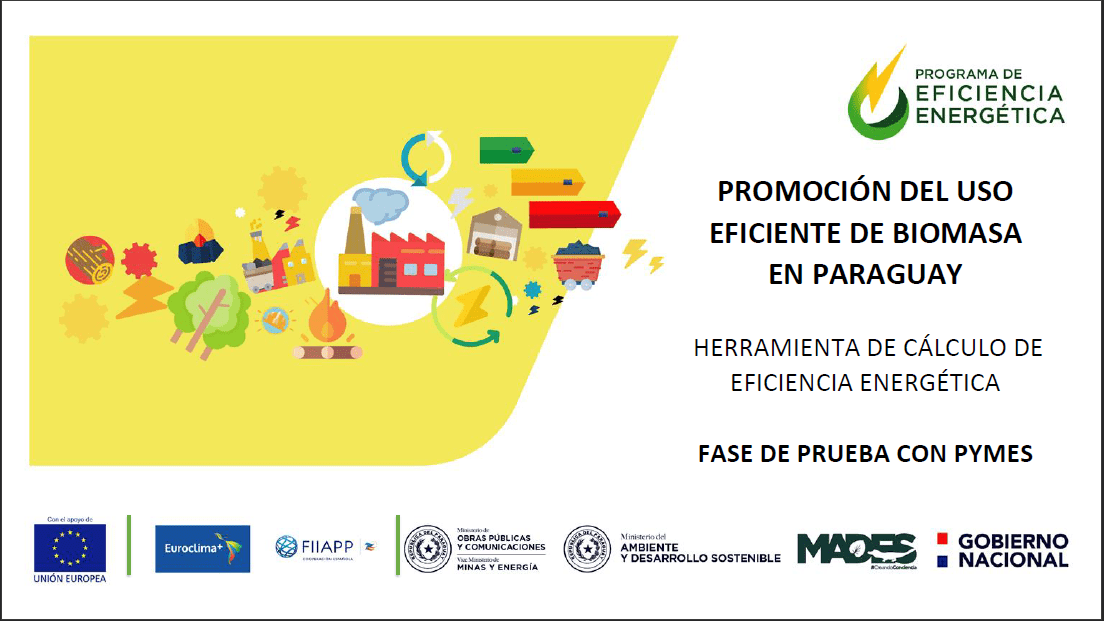The testing phase of the calculation tool that will allow small and medium-size enterprises to reduce emissions related to biomass consumption has started.
Asunción, Paraguay, 3 June.- In the framework of the Energy Efficiency Programme, promoted by the Vice Ministry of Mines and Energy and the Ministry of Environment with the support of the EUROCLIMA+ programme, the testing phase of the so-called "Calculation Tool" began, which will allow small and medium-sized enterprises (SMEs) in four sectors (ceramics, yerba mate, chicken farming and grain drying) to carry out self-diagnoses of energy consumption in order to adopt measures for the efficient use of biomass.
This workshop began the testing of the innovative tool that is being developed with help from the International and Ibero-America Foundation for Administration and Public Policy (FIIAPP) under the framework of the EUROCLIMA+ programme, a cooperation programme on climate change between the European Union and Latin America. The event was attended by Ulises Lovera, Director of the National Directorate of Climate Change, and on behalf of the Vice-Ministry of Mines and Energy, Gustavo Cazal, Director of Alternative Energies of VMMyE and Diana García Alcubilla, Deputy Head of Cooperation of the European Union Delegation in Paraguay representing the VMMyE of MADES. The action framework of the Programme was briefly presented and the prototype of the tool was presented in more detail.
The tool will be easy to use and will soon be available on the website of the Vice-Ministry of Mines and Energy, where agro-industrial SMEs in the aforementioned sectors and those interested in general will be able to carry out the simulations free of charge and with the possibility of receiving technical support.
As a result of the self-diagnosis, companies will be able to identify their high energy consumption points and, based on this, estimate a reduction in consumption during their production processes. With the data obtained, they will be able to have a first estimate of the economic and environmental benefits that the implementation of energy efficiency measures may entail.
In this way, the aim is to encourage SMEs to invest in technologies that allow them to use less biomass (wood, coal, etc.) and thus achieve economic savings while reducing their CO2 emissions for the benefit of the environment.
Efficient use of biomass in Paraguay
This initiative is part of the Programme for the Promotion of the Efficient Use of Biomass in Paraguay which aims to encourage the productive sector to implement energy efficiency measures due to the economic, social and environmental benefits it generates. It promotes the saving and efficient use of resources in the agro-industrial facilities of SMEs that use biomass as the main fuel in their production processes, such as dryers for yerba mate, grains, pottery, ceramics and establishments for breeding and fattening chickens.
With this Programme, Paraguay reinforces its commitment to the promotion of clean and energy efficient technologies, which at the same time contributes to the consolidation of national actions such as the National Energy Policy 2016-2040, the mitigation strategy included in the National Climate Change Policy and the achievement of the GHG reduction commitments set forth in Paraguay's NDC.
About EUROCLIMA+
EUROCLIMA+ is a programme funded by the European Union to promote environmentally sustainable and climate-resilient development in 18 Latin American countries, particularly for the benefit of the most vulnerable populations. The Programme is implemented under the synergistic work of seven agencies: the Spanish Agency for International Development Cooperation (AECID), the French Development Agency (AFD), the Economic Commission for Latin America and the Caribbean (ECLAC), the German Society for International Cooperation (GIZ), Expertise France (EF), the International and Ibero-America Foundation for Administration and Public Policy (FIIAPP), and UN Environment.
Contact
Daniel Fernández This email address is being protected from spambots. You need JavaScript enabled to view it.
